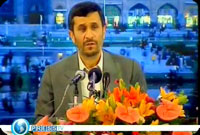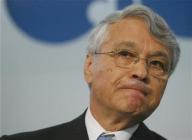
Iran’s President Mahmoud Ahmadinejad
Iran urges the OPEC member states again to convert their cash reserves into a basket of currencies rather than the tumbling US dollar.
Speaking at a ceremony to open the 29th ministerial meeting of the OPEC Fund for International Development (OFID), Iran’s President Mahmoud Ahmadinejad repeated his proposal made about six months ago in a rare summit of the Organization of Petroleum Exporting Countries’s heads of states.
“The fall in the value of US dollar is one of the pressing problems of the world today,” warned the Iranian president at the conference in Isfahan on Tuesday.
He further expressed concern over the adverse effect of the dollar depreciation on the international community, especially energy exporting countries through increasing the price of commodities like wheat, rice and oilseeds. (This could have also been said by Ron Paul or Jim Rogers. – The Infinite Unknown)
Ahmadinejad said he warned six months ago in the summit conference in Riyadh that there were many indications pointing to continued fall in the value of the greenback.
“And we see that this continues to happen and the resources and wealth of OPEC member countries have been hugely damaged.
“I again repeat my previous proposal; we should have a basket of different international hard currencies as the basis or the member countries should come up and produce a new hard currency for petroleum contracts,” he stressed.
“They get our oil and give us a worthless piece of paper,” Ahmadinejad said earlier after the close of the summit in the Saudi capital of Riyadh. (Which is absolutely correct too.)
The comments by the Iranian president gained backing from Venezuelan President Hugo Chavez as he said at the same event, “The empire of the dollar has to end.”

